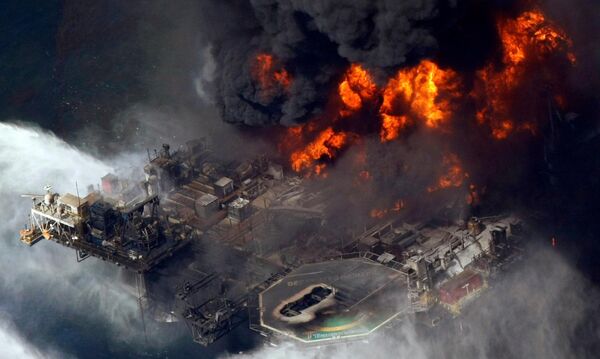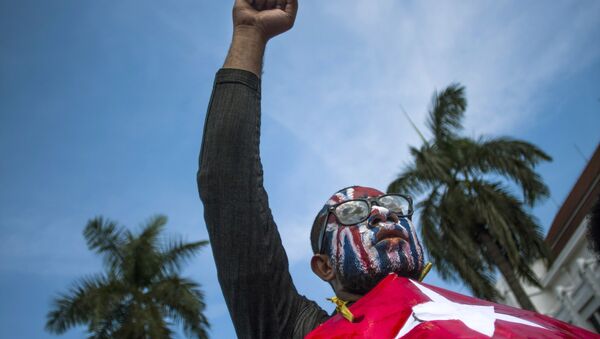BP has a checkered past when it comes to oil and gas exploration and now it is being accused of putting its foot in it again with an investment in Indonesia.
In every village the people of #WestPapua are signing the petition to #LetWestPapuaVote #Referendum. SIGN & SHARE: https://t.co/DoTRDsnnko pic.twitter.com/DLMucjBOut
— Free West Papua (@FreeWestPapua) May 19, 2017
In 2016, a US judge approved an estimated US$20 billion settlement by BP Oil over the catastrophic 2010 Deepwater Horizon spill of hundreds of millions of gallons of crude oil in the Gulf of Mexico.
And in 2006, BP agreed an out of-court settlement with a group of Colombian farmers who had demanded US$28 million in compensation. They claimed the Ocensa pipeline in Colombia was a health risk and claimed paramilitary groups had threatened them for opposing the pipeline, although it was never alleged the paramilitaries were linked to BP.

Now the British company is embroiled in a new dispute in West Papua, a territory which became part of Indonesia in controversial circumstances in 1969.
Connor Woodman, a researcher with the Politics of Papua Project at the University of Warwick, told Sputnik that Indonesia took over the former Dutch colony after a bogus referendum.
"It was called the Act of Free Choice, although West Papuans call it the Act of No Choice. The Indonesian military handpicked 1,026 West Papuans who were bribed, cajoled and threatened into voting unanimously for what was Dutch New Guinea to join Indonesia," Mr. Woodman told Sputnik.
In the intervening decades tens of thousands of Indonesian peasants from other parts of the archipelago were encouraged to settle in West Papua and they may now outnumber the indigenous population.
Indonesia's state-owned electricity company PLN signs agreement to buy LNG from BP’s Tangguh project https://t.co/fKgiJUeWIA pic.twitter.com/mGAYYIW5NF
— David Williams (@Cdn_Jkrta) May 18, 2017
Indonesia has been accused of widespread human rights abuses in the territory, which forms the western half of the island of New Guinea. The eastern half is the independent state of Papua New Guinea, whose people are kinfolk of the West Papuans.
"There is a paucity of information about the situation on the ground. But 100,000 Papuans have died. There is rampant torture. NGOs and the media are banned and it is even illegal to fly the West Papuan flag," Mr. Woodman told Sputnik.
The territory sits on vast and largely unexploited mineral resources, which explains why Indonesia is so keen not to give it up.
The Grasberg mine, operated by Freeport, is the world's largest gold mine and the third largest copper mine in the world.
#Indonesia's Foreign Minister #RetnoMarsudi CANNOT stop the people of #Melanesia from supporting #WestPapua #Wantoks at the #MSG #Freedom pic.twitter.com/nVNxW8JRQI
— Free West Papua (@FreeWestPapua) May 19, 2017
It is into this tumult that BP has stepped.
In 2016, BP announced they had decided to invest in the Tangguh Expansion Project, which will lead to the exploitation of 14.4 trillion cubic feet of LNG.
Most will be sold to the Indonesian electricity company PT PLN but some will also be supplied to the Kansai Electric Power Company from Japan.
"West Papua has become what Naomi Klein calls a 'sacrifice zone', a subset of humanity categorized as less than fully human, their poisoning in the name of progress somehow acceptable," Mr. Woodman said.
"BP has been pretty successful at monopolizing the narrative on Tangguh. They have set up an independent advisory panel. It is questionable how independent it is but there is no doubt their record is better than Freeport.
"They did not want to repeat the PR disaster they had in Colombia so they have been careful about their security arrangements, although they are still collaborating with the Indonesian military," said Mr. Woodman.
"LNG is less damaging than open cast mining so you won't find the same level of concern from environmentalists."
He said many West Papuans have been moved off their land and there are jealousies between those villages who BP have compensated and those they have not.
"But the fundamental problem with it is that it further ties the Indonesian regime into its control of West Papua. Having BP in there does lend legitimacy to Indonesian sovereignty and that is the number one issue for West Papuans," Mr. Woodman told Sputnik.
The United Liberation Movement for West Papua has been demanding a fresh referendum on self-determination but so far, apart from Vanuatu and a handful of other tiny Pacific nations, no other government has supported the idea.
Support INTERNATIONAL SUPERVISED VOTE FOR WEST PAPUA#BackTheSwim#LetWestPapuaVote#FreeWestPapua pic.twitter.com/t7mrUDaNz5
— reghy wenda (@wenda_reghy) May 14, 2017
BP points out that it has committed to ensuring 85 percent of the skilled workforce at Tangguh are Papuan by 2029.
The firm's Regional President Asia Pacific, Christina Verchere, said last year: "This final investment decision marks the culmination of many years of hard work by BP, our partners and the Indonesian government."


